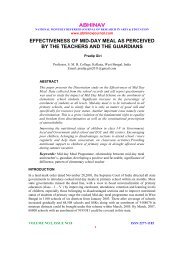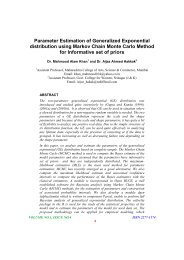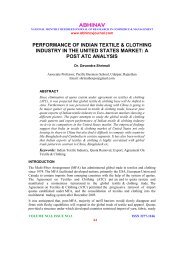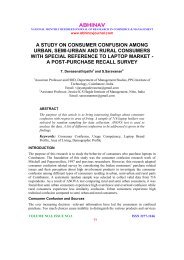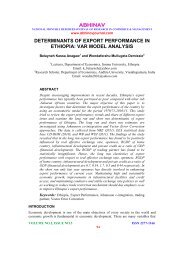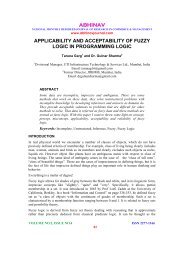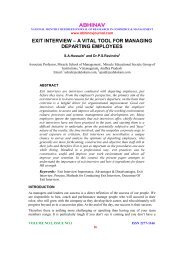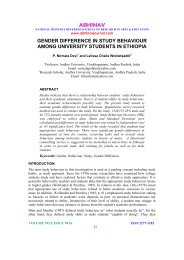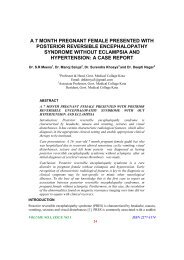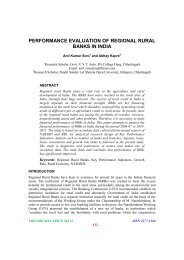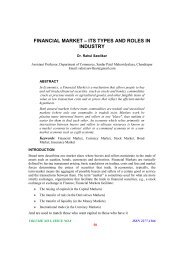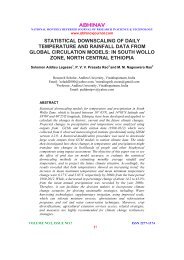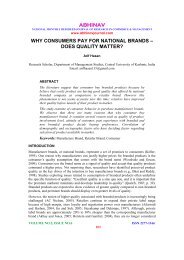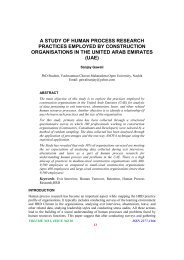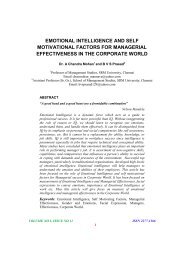Parsis moving beyond custom and tradition: Bapsi Sidhwa's
Parsis moving beyond custom and tradition: Bapsi Sidhwa's
Parsis moving beyond custom and tradition: Bapsi Sidhwa's
Create successful ePaper yourself
Turn your PDF publications into a flip-book with our unique Google optimized e-Paper software.
PARSIS MOVING BEYOND CUSTOM AND<br />
TRADITION: BAPSI SIDHWA’S- A VOICE TO<br />
VOICELESS<br />
Iftikhar Hussain Lone<br />
Teaching assistant, Axis English Academy, Anantnag, Kashmir<br />
Email: iftieng@gmail.com<br />
Feroza slipped under her quilt fully dressed, her eyes wide open, her mind throbbing with<br />
elation. She was going to America! She found if difficult to believe. She repeated to herself<br />
“I’m going to America, I’m going to America!” until her doubts slowly ebbed <strong>and</strong> her<br />
certainty too, caught the rhythm of her happiness to the l<strong>and</strong> of glossy magazines, of<br />
“Bewitched” <strong>and</strong> “Star Trek,” of rock-stars <strong>and</strong> Jeans… (An American Brat 27)<br />
It is quite natural for a writer to give room to his own culture <strong>and</strong> social background in one’s<br />
writings. <strong>Bapsi</strong> Sidhwa, the much acclaimed novelist is not an exception in presenting the<br />
essential ethos of her society. Being a Parsi by birth, she is profoundly rooted in her own<br />
Parsi culture <strong>and</strong> beliefs <strong>and</strong> completely engrossed in it. <strong>Bapsi</strong> has given voice to all that<br />
happened to her in <strong>and</strong> outside her home. Her own life becomes the representation of the<br />
Parsi minority girls <strong>and</strong> women later on. The atmosphere at home was very much like found<br />
in Asian houses. Rooted in displaced or double Diaspora conditions, the characters in<br />
Sidhwa’s novels are initiated into a self awakening or self realization or at other times an<br />
awakening into one’s own culture. Instigation, self-awakening or in other words a voyage<br />
into oneself is one of the major characteristics of Sidhwa’s novels. These characters undergo<br />
an awakening into a political consciousness <strong>and</strong> a consciousness into their own bodies <strong>and</strong><br />
their indigenousness, which result in a general outward growth <strong>and</strong> development into the<br />
sub-continental human psyche. Thus, Sidhwa’s characters are all strong reflections of the<br />
sub-continent people who have attained awakening <strong>and</strong> have come to terms with the time<br />
testing ruthless of the culture they are living in. In Ice-C<strong>and</strong>y-Man Lenny displays a self<br />
realization <strong>and</strong> acceptance of her polio, <strong>and</strong> her sexuality, of her indigenousness as a Parsi<br />
which provides her the advantage of being a detached observer during the partition, <strong>and</strong> with<br />
this she come to terms with a new identity, of being a Pakistani, ‘in a snap.’ (40) But this<br />
ability to easily shift allegiances, to hybridize her, to hold her personal safety over country<br />
<strong>and</strong> culture, is so much part of Parsi indigenousness. The <strong>Parsis</strong> shun their community<br />
restraints to help universal peace <strong>and</strong> progress.<br />
Sidhwa’s characters show invincible courage in breaking loose from the <strong>custom</strong>ary <strong>and</strong><br />
<strong>tradition</strong>al practices of her community. She let herself loose from such practices<br />
occasionally. She writes:<br />
There are those who don’t like to mix with me anymore, because I am so talked about <strong>and</strong><br />
written about, <strong>and</strong> that is looked down upon, frowned upon slightly someone’s husb<strong>and</strong><br />
would feel. This girl is a bad influence on everybody. (Zaman 174)<br />
VOLUME NO.1, ISSUE NO.6 ISSN 2277-1182<br />
6
ABHINAV<br />
NATIONAL MONTHLY REFEREED JOURNAL OF REASEARCH IN ARTS & EDUCATION<br />
www.abhinavjournal.com<br />
The novel Ice-C<strong>and</strong>y-Man plays a key role in <strong>Bapsi</strong>’s oeuvre intertwining her Pakistanis<br />
identity, with her Parsi roots, giving voice to the guiding preoccupations of her work; the fate<br />
of the dispossessed <strong>and</strong> the dem<strong>and</strong> of the East; the onslaught of revenge <strong>and</strong> violence to<br />
which the women of the other communities are subjected to in the name of faith <strong>and</strong> nation.<br />
It also brings forth the <strong>Parsis</strong> moral position when faced with the religious <strong>and</strong> ethnic<br />
dilemmas of their Muslim, Sikh <strong>and</strong> Hindu neighbours. <strong>Bapsi</strong> shows <strong>Parsis</strong> act <strong>beyond</strong> their<br />
religion as they are found involved in many tasks of helping the refugees from India <strong>and</strong><br />
those leaving Lahore. They provide them petrol, drinks, comfort <strong>and</strong> other basic amenities.<br />
The rescued kidnapped women are sent back to their families by <strong>Parsis</strong>. Explaining their<br />
secretive <strong>and</strong> seemingly suspicious outings, Lenny’s mother says: “I wish I’d told you. We<br />
were only smuggling the rationed petrol to help our Hindu <strong>and</strong> Sikh friends to run away. And<br />
also for the convoys to send kidnapped women, like your Ayah, to their families across the<br />
border.” (242)The motivation behind such selfless <strong>and</strong> noble actions by Lenny’s mother is<br />
neither individual heroism nor political fanaticism. Zoroastrian ethics of “good deeds” are<br />
the basis for such charitable acts. A remarkable energy of rescuing Ayah from the “Kotha” is<br />
shown by Rodabai, Lenny’s Godmother. She takes Ayah to a rescued women camp <strong>and</strong> then<br />
arranges to send her to her relatives in Amritsar.<br />
The Crow Eaters narrates the journey to establish superiority, to Westernization <strong>and</strong><br />
hybridity <strong>and</strong> a subsequent journey back to reassert inactiveness. Freddy, Putli <strong>and</strong> Jerbanoo<br />
embark on the much awaited trip to Engl<strong>and</strong>, “…. the Engl<strong>and</strong> of their imaginings was<br />
burnished to an antiseptic gloss that had no relation to human menial toil.” (The Crow Eaters<br />
252) But moments after their arrival in the enchanted l<strong>and</strong> of their dreams, their excitement<br />
turns into disillusionment, as they see Englishmen sweeping streets <strong>and</strong> working as clerks,<br />
sales girls equally. They also find houses with no servants where people had to scrub their<br />
own toilet bowls. Thus a disgruntled Jerbanoo cries: “I want to go back to my Lahore. I don’t<br />
want to die in a foreign l<strong>and</strong>.” (258)<br />
Feroza undergoes the initiation into the indigenousness of her country <strong>and</strong> culture <strong>and</strong> the<br />
need to bond her identity to it in An American Brat. She undergoes a Journey into the depths<br />
of the alien culture in an effort to adopt <strong>and</strong> assimilate an independence <strong>and</strong> strength of<br />
charade <strong>and</strong> decision which was denied to her. But in the journey of the novel, she gets<br />
disillusioned by the Westernization, the foreignness <strong>and</strong> the borrowed identity. She is<br />
consoled by her Indian friend <strong>and</strong> his ghazals, in the essence of being a Parsi, in the ‘Sudra’<br />
<strong>and</strong> ‘Kusti’ <strong>and</strong> the Security <strong>and</strong> power which it gave to her in desolation, being rejected by<br />
her Jewish boyfriend who refuses her country, religion <strong>and</strong> <strong>custom</strong>s <strong>and</strong> the incompatibility<br />
of an intercommunity marriage being dawned upon her.<br />
The Crow Eaters is full of Charm <strong>and</strong> exuberance, imparting in its excellence the magic <strong>and</strong><br />
colour of India. In the novel, Freddy’s <strong>tradition</strong>al views are revolted by his own son <strong>and</strong> thus<br />
elements of <strong>tradition</strong> <strong>and</strong> innovation get amalgamated in the sections of the novel. A succinct<br />
account of the success of a Parsi businessman, from rags to riches, Sidhwa brings into it a<br />
strongly attractive world of doing business in British India. An extraordinary tale of very<br />
ordinary people, the story takes twists <strong>and</strong> turns <strong>and</strong> goes from one generation to another<br />
with ease <strong>and</strong> flow. The descriptions are solid <strong>and</strong> the pace <strong>and</strong> humour makes a perfect<br />
combination to transform the story into a magical tale. There is very little that Sidhwa’s pen<br />
misses as she creates an array of delightful, Idiosyncratic <strong>Parsis</strong>. The result is a gallery of<br />
VOLUME NO.1, ISSUE NO.6 ISSN 2277-1182<br />
7
ABHINAV<br />
NATIONAL MONTHLY REFEREED JOURNAL OF REASEARCH IN ARTS & EDUCATION<br />
www.abhinavjournal.com<br />
pictures but prose remains boisterous <strong>and</strong> baroque. The <strong>Parsis</strong> have always been a<br />
flamboyantly prominent community in public life. What goes on behind this façade had been<br />
remote <strong>and</strong> mysterious. They have been described as smart <strong>and</strong> talkative. They are<br />
innovative <strong>and</strong> imaginative entrepreneurs, with business in their genes. Best of all they are<br />
ribald, something comparable to Galsworthy’s fore sites. Sidhwa opens all doors <strong>and</strong><br />
windows of the world’s innermost recess. Far from ridiculing the <strong>Parsis</strong>, the novel celebrates<br />
their community, <strong>and</strong> in turn, celebrates the all encompassing idea of community.<br />
<strong>Bapsi</strong> Sidhwa shows <strong>Parsis</strong> extremely preoccupied with abiding Westernization <strong>and</strong><br />
following British ways. One of the reasons of it being the long st<strong>and</strong>ing policy of the<br />
community of proximity towards state, a close relationship between state <strong>and</strong> community<br />
based on mutual support. In consideration with their limited status of a minority community,<br />
the <strong>Parsis</strong> dem<strong>and</strong>ed religious autonomy <strong>and</strong> protection, in return to their consistent loyalty.<br />
It is why Freddy took every opportunity to show his undying support <strong>and</strong> loyalty towards the<br />
British Raj by taking care to wear his most splendid clothes whenever he visited the<br />
Government House <strong>and</strong> sign his name in visitor’s Book, to ascertain his testimony <strong>and</strong><br />
loyalty towards “Queen <strong>and</strong> Crown”.<br />
The changing prospects <strong>and</strong> freedom from conventions mixed with dreams of flying to the<br />
l<strong>and</strong> of rock stars <strong>and</strong> Jeans make feroza in An American Brat feel the joy of her life. A trunk<br />
call to America puts Feroza’s face to face with the infirmities she would have taken with her<br />
culture <strong>and</strong> position to a much upgraded society. As she screams in delight to her uncle<br />
Manek, over the phone, he says: “Why do you third world Pakis shout too much?”<br />
(26).Amid the excitement of transporting herself to her dream l<strong>and</strong>, this touches a chord<br />
somewhere <strong>and</strong> she asks her parents: “…. Why am I a Paki third worlder?”(27)<br />
As the flight halts at Dubai, Paris <strong>and</strong> London, people who had boarded the plane with her,<br />
had almost all left, <strong>and</strong> new passengers joined her for the rest of the journey substituting<br />
cultures for cultures, preparing Feroza for the foreign atmosphere awaiting her in New York,<br />
where she would step down into a totally new world. The cultural bias that comes along with<br />
third world tag, awaits her no farther than the passport counter where she is quizzed on<br />
different things by cold, <strong>and</strong> unsmiling officers who seemed to doubt anything she said.<br />
Feroza was quite new to such unfriendly dispositions: “It was Feroza’s first moment of<br />
realization – she was in a strange country amidst strangers…” (54)<br />
The humiliating mistrust that meets her at the immigration further shocks her solid sheath of<br />
dignity, <strong>and</strong> pushes her down the threshold of third world prejudice <strong>and</strong> object<br />
demoralization. Grilled by the officers, smarting tears, unable to withhold anymore<br />
tormenting, she screams in a yellow blaze of fury <strong>and</strong> fierce dignity: “To hell with you <strong>and</strong><br />
your damn country. I’ll go back.” (58) It shows the contrast between two opposite cultures- a<br />
thought that would just cross her mind, now <strong>and</strong> then, years later. Freed from the<br />
embarrassment at the airport, Feroza gets in to the excitement of discovering America- the<br />
bright city lights, the sky scrapers, the museums, the lavish display of pearls <strong>and</strong> designer<br />
accessories in the window:<br />
The sheer bliss of telephones that worked, come cloud or drizzle, the force of the water in the<br />
YMCA showers, electricity that never fluctuated or broke down or required daily hours of<br />
‘Load shedding’ were joys Feroza was discovering for herself. (102)<br />
VOLUME NO.1, ISSUE NO.6 ISSN 2277-1182<br />
8
ABHINAV<br />
NATIONAL MONTHLY REFEREED JOURNAL OF REASEARCH IN ARTS & EDUCATION<br />
www.abhinavjournal.com<br />
The novel An American Brat is a sensitive portrait of how America appears to a new arrival<br />
<strong>and</strong> an exploration of the impact it has on her. She is caught in the strange beauty of<br />
beautiful America <strong>and</strong> things take her by surprise. America is within the hearts of <strong>Parsis</strong> as a<br />
l<strong>and</strong> of dreams of liberty <strong>and</strong> of freedom from age-long conventionalities. Feroza also<br />
discovers that there is another side to America’s alluring magic “… an ‘alien filth’. So<br />
you’ve seen now, America is not all Saks <strong>and</strong> skyscrapers.” (156)<br />
Out at the airport <strong>and</strong> away from the insults <strong>and</strong> dehumanising behaviours of the officers,<br />
Feroza forgets her first disturbing impressions of having left her culture for the alluring<br />
attractions of an alien soil as she indulges in a tour of New York. She shouts at the sight of<br />
the incredible lighting of the city in Punjabi "Vekh! Vekh! Sher-di-batiaan" (Look, Look, the<br />
lights of the city) The sky-high buildings with its shimmering glass <strong>and</strong> steel embankments<br />
reflecting the sunlight are all wondrous sights to her. She marvels at the quick service at the<br />
restaurants, the quantities of fries, ketchup <strong>and</strong> coke. The opulence in the city mesmerizes a<br />
wide gaping Feroza:<br />
It was like entering a surreal world of hushed opulence festooned by all manner of hats<br />
propped up on st<strong>and</strong>s <strong>and</strong> scarves <strong>and</strong> belts draped here <strong>and</strong> there like fabulous confetti. The<br />
subtle lighting enhanced the plush shimmer of wool <strong>and</strong> leather <strong>and</strong> the glowing colours of<br />
the silk. Feroza felt she had never seen such luxuriant textures or known the vibrant gloss of<br />
true colours. (73)<br />
Though initially depressed <strong>and</strong> saddened at her change of fortune, Feroza refuses to return to<br />
Pakistan or marry any one of the three eligible boys chosen for her. While she still turns to<br />
her religion, culture <strong>and</strong> civilization, the music, ghazals <strong>and</strong> memories to connect her to a<br />
well ordained identity, Feroza is a changed girl, different from the one that had left Pakistan.<br />
“Their preoccupation with children <strong>and</strong> servants <strong>and</strong> their concern with clothes <strong>and</strong><br />
furnishings did not interest her. Neither did the endless round of parties that followed their<br />
parents' mode of hospitality.” (312) She had experienced freedom from the restraining<br />
<strong>tradition</strong>s, the disturbing ordinances, the sight of poverty, the insecure social ties, the<br />
oppression <strong>and</strong> discrimination against women, <strong>and</strong> refused to let it go. The sense of<br />
dislocation <strong>and</strong> of not belonging though would be part of her existence throughout; it seemed<br />
more tolerable than a fateful return to all that she had left behind for the better.<br />
Shashi, her friend at the university, tries to comfort a dejected Feroza, after her break-up with<br />
David, by dramatically uttering a ghazal by Iqbal Banoo, “Ulfat Ki Naee Manzil Ko<br />
Chalay... (To reach new destinations of love), Embarked on a new mission of love,<br />
You who have broken my heart, look where you're going I, too, lie in your path.” (311)<br />
Feroza, being brought up in the midst of conventional <strong>Parsis</strong> <strong>and</strong> Muslim environments,<br />
st<strong>and</strong>s confused to accommodate the most of both <strong>and</strong> runs herself to the extremities called<br />
forth by either community. She was quick to adapt to the <strong>tradition</strong>s of a Muslim nation by<br />
natural effect of her peers <strong>and</strong> the school she attended in Pakistan, giving birth to her<br />
mother's growing concern towards her retreat into her shell <strong>and</strong> considerable<br />
backwardness.Moulded in American culture <strong>and</strong> style, Feroza again feels left out when she<br />
goes to Pakistan on a holiday <strong>and</strong> sees for herself the measure of things changed. “Time had<br />
wrought alterations she could not have foreseen-while her memory had preserved the people<br />
<strong>and</strong> places she knew, <strong>and</strong> their relationships with her, as if in an airtight jar.”(235)<br />
VOLUME NO.1, ISSUE NO.6 ISSN 2277-1182<br />
9
ABHINAV<br />
NATIONAL MONTHLY REFEREED JOURNAL OF REASEARCH IN ARTS & EDUCATION<br />
www.abhinavjournal.com<br />
In confrontation with age-old practices <strong>and</strong> unquestionable rituals, love <strong>and</strong> passion st<strong>and</strong><br />
bleak <strong>and</strong> an imminent option between the two. The very thing that had attracted him to<br />
Feroza, her exoticism, now frightened David. Zareen had made him feel that he <strong>and</strong> Feroza<br />
had been too cavalier <strong>and</strong> callow in dismissing the dissimilarities in their backgrounds. He<br />
felt inadequate, wondering if he could cope with some of the rituals <strong>and</strong> behaviour that,<br />
despite his tolerant <strong>and</strong> accepting liberality, seemed bizarre." (309)<br />
Feroza once again feels alone in her world, after her experiment with company <strong>and</strong> after her<br />
choice to drift away into a region of bliss <strong>and</strong> liberation, she settles down to heartbreak.<br />
“Feroza wept, yearning for the l<strong>and</strong> of poets <strong>and</strong> ghazals she had left behind, for her friends<br />
from the Convent of the Sacred Heart, <strong>and</strong> for her own broken heart-when it occurred to her<br />
that she had thought of everything in past time.” (311) Feroza’s heart leaps up for what she<br />
had very consciously left. She is aware of the fact that world which had changed <strong>beyond</strong><br />
recognition alienated her. "For even in her bereft condition, she knew there was no going<br />
back for her, despite the poets <strong>and</strong> her friends.” (311)<br />
So, Sidhwa throughout her novels presents Parsi inclination to move <strong>beyond</strong> the <strong>custom</strong>ary<br />
boundaries <strong>and</strong> their longing back for the Parsi <strong>tradition</strong>. The pain over the lost <strong>tradition</strong><br />
proves too heavy for her characters <strong>and</strong> nothing compensates it in the end.<br />
REFERENCES<br />
1. Sidhwa, <strong>Bapsi</strong>. An American Brat. USA: Milkweed,1993.<br />
2. - - - - - Ice-C<strong>and</strong>y- Man. Engl<strong>and</strong>: Penguin,1991<br />
3. - - - - - The Crow Eaters. Engl<strong>and</strong>: Penguin,1980.<br />
4. .Beauvoir, Simone de. The Second Sex, 1949. Translated by H.M. Parshley. New Delhi:<br />
Penguin,1972.<br />
5. Bharucha, Niluten.E. From Behind a Fine Veil: A Feminist Reading of Three Parsi<br />
Novels. Indian Literature, 39.5, 1996.<br />
6. Dhawan, R.K. <strong>and</strong> Novey Kapadia. The Novels of <strong>Bapsi</strong> Sidhwa. New Delhi: Prestige,<br />
1996.<br />
7. Gaur, Rashmi ed. “The Child Narrator in Ice-C<strong>and</strong>y-Man.” <strong>Bapsi</strong> Sidhwa’s Ice-C<strong>and</strong>y<br />
Man: A Reader’s Companion. New Delhi: Asia Book Club,2004.<br />
8. Hai, Ambree. “Border Work, Border Trouble: Postcolonial Feminism <strong>and</strong> The Ayah in<br />
<strong>Bapsi</strong> Sidhwa’s Cracking India.” Modern Fiction Studies. 46.2, 2000.p 379-426.<br />
9. Niruparani, K.. “Gender <strong>and</strong> Imagination in <strong>Bapsi</strong> Sidhwa’s Fiction”. Fiction of Nineties.<br />
Noble Dass, Veena & R.K. Dhawan eds. New Delhi: Prestige, 1994. 155-161.<br />
10. Menon, Ritu. “Do Women Have a Country.” Gender to Nation. Eds. Rada Ivekovic &<br />
Julie Mostov. 2008, (404), 3.<br />
11. Moi, Toril. “Feminist Literary Criticism.” In Modern Literary Theory: A Comparative<br />
Introduction. Ann Jafferson <strong>and</strong> David Robey eds. London: Batsford, 1982.<br />
12. Paranjape, Makar<strong>and</strong>. “The Early Novels of <strong>Bapsi</strong> Sidhwa.” The Novels of <strong>Bapsi</strong><br />
Sidhwa. New Delhi: Prestige Books, 1996. 24<br />
VOLUME NO.1, ISSUE NO.6 ISSN 2277-1182<br />
10
ABHINAV<br />
NATIONAL MONTHLY REFEREED JOURNAL OF REASEARCH IN ARTS & EDUCATION<br />
www.abhinavjournal.com<br />
13. Pennebaker, Mattie Katherine. “The Will Ok Men.” Victimization of Women During<br />
India’s Partition’s. Agora No. 1, Issue I, Summer 2000.<br />
14. Sharma, Bhawna. “<strong>Bapsi</strong> Sidhwa: Giving Voice to Silence.” JELL. Vol. II, No.1, June<br />
2008.<br />
15. Sidhwa, <strong>Bapsi</strong>. Post-Colonial Studies: The Essential Glossary. London: Arnold, 2003.<br />
16. Zaman, Niaz. “Images of Purdah in <strong>Bapsi</strong> Sidhwa’s Novels”. Margins of Erasure:<br />
Purdah in Subcontinental Novel in English. Jain, Jasbir & Amina Amin eds. New Delhi:<br />
Sterling Publishers Pvt. Ltd.<br />
VOLUME NO.1, ISSUE NO.6 ISSN 2277-1182<br />
11



